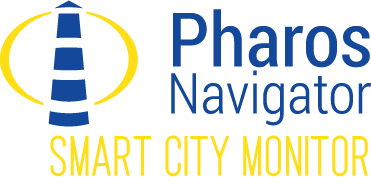Smart City project to pilot and prototype the Future

Starting in small steps
Smart City concepts and IoT became increasingly attractive for many people, provoking intense discussions, conferences, meetings, publications and events. There is common understanding that urban areas are quickly changing along with the climate, environment, economics, energy, transportation and society in general. Many but (not all yet) recognized that more intelligent ways of urban management and governance are necessary to deal with these accelerated change and complexity.
However, looking beyond, the buzz into practical solutions which are based on new smart technologies, the interplay between administrations, planning and deployment providers, and the upsides and shortfalls of new solutions is still fairly difficult for the most of communities internationally.
- What does a “Smart City” actually means for real middle size city or town?
- What are the practical needs, possible benefits and challenges?
- How to foster the capacity of each community for smart management of complex urban processes, have it transparent, effectively improve life quality and attract investments and tourists without negative impacts to the community life?
- What need to be done to make residents happier by the next elections?
- How to have the results presented to the citizens in a simple way and engage them into participation?
Answering these and many other relevant questions requires expertise and deep knowledge of concrete local communities, its infrastructure, life patterns, resources as well as experience in implementation of Smart City projects. And all these increasingly require real time vison of processes of change as well as its prediction to be prepared to meet the challenges at the right time and in the right way.
However, to date, the examples of effective integrated solutions to all these issues are rare.
Due to the complexity and scale of the whole Big Urban System of Systems, novelty of many technologies required for Smart City projects, its quick change and high costs, there is principally no way to implement and have the Smart City project “Just Right”.
Smart City prototyping, experimenting and new knowledge development
The level of investments and relevant risks require adaptive strategy of Smart City concepts implementation in the multiple cycles of the spiral development
“Planning next step –> Prototyping –> Experimenting -> Evaluation the results –> Planning new step”
It fosters
- Maximising the intermediate results to avoid big investments and relevant risks
- Evaluating the achievements and efficiencies after each small step
- Better understanding of needs and achievements, possibilities and consequences after each step
- Accumulating the knowledge and learning about the future to come helping community to formulate own vision, approaches and priorities
- Selecting the solutions which are the best for the local urban ecosystem
- Presenting the successful achievements to the citizens for their acceptance
- Scaling up the best selected solutions to achieve predictable results ensuring success of Smart City implementation and its high Return on Investments
- Becoming better prepared and save the costs of the future infrastructural adaptation
- Experimenting with new business models, the options enabling digital economy
- Developing leading role as innovative community to attract investments and improve the quality of life
Realized by the multidisciplinary team including city specialists, urban planners and local service providers, such Smart City project piloting begins by building up this local Smart City Team as small core group of local specialists to support the project planning and developing the local Smart City Model.
The main stages of the project could include as follows:
- Analyzing the concept status and practical achievements, discussion of the options applicable to the local Smart City project and its priorities
- Reviewing new options provided by latest technologies and social scientists who can help cities to unlock the potential where administrators didn’t look
- Making local businesses aware of new smart opportunities and engaging them into the discussion of their interests and possible contributions
- Formulating the community objectives such as maximizing citizen benefits, enabling commercially successful services and mitigating climate change, supporting of the tourism and citizens, making the implementation of the city administration tasks more efficient and transparent to citizens while optimizing the costs
- Discussing the issues with infrastructure providers to gain a better understanding of the often-unspoken constraints that cities operate under
- Prioritizing the list of objectives accordingly to its added value and expected costs
- Selecting the ones with the highest priorities which can be implemented with minimum costs but introduce maximum benefits for the community in economic or financial or environmental terms
- Formulating the plan of actions putting the main focus on experimenting and knowledge gains
- Realizing the first small steps with minimum costs and maximum knowledge and outcomes at each step of the implementation
The ultimate goals of the prototyping and experimenting could be as follows:
- Developing practical knowledge
- Identifying and demonstrating smart practical examples and solutions
- Implementing the instruments and concepts that have been proven in practice and can be scaled up without risks and losses
- Realizing the potential to foster transition to digital economies, holistic vision of the city life and its quality, innovative and cross-linked tools and solutions in order to make the energy supply efficient and environmentally friendly, formulate energy service models, smart and sustainable city districts, smart citizens and attractiveness for tourists and investors.
Contributing to Smart City prototyping and new knowledge development
GOLEM Integrated Microelectronics Solutions GmbH, ASIDEES and national partners offer the city municipalities effective support in the implementation of the unique Smart City Monitor technology as a key digital transformation component of the Smart City project success. It enables linking of multiple heterogeneous urban data sources (IoT, sensors, smart meters over LoRaWan, 5G, etc.), various automated systems such as SCADA and others, web servers and databases including MS Excel tables) and transformation of these big data streams into holistic monitoring, analytics and controls of diverse urban processes in real time.
The Smart City Monitor actually runs the Digital Twin of the whole City that provides rich set of customized analytics and controls tuned to the interests of each stakeholder group including the administration, utility provides, public services, citizens, tourists and visitors. The Twin becomes the advanced AI- and Big Data driven real time transformation engine for experimenting with advanced Smart City solutions, digital economy and agenda, new business models that provides full transparency and analytic tools for evaluation of results and its forecasts by everyone interested in the urban development.
As a part of the whole Smart City project, which has multiple large infrastructural components, the Smart City Monitor technology has a tiny fraction of total project costs and require minimum investments while providing strong evidence basis for the success of the whole project.
Its typical implementation in the urban communities consists of the following practical steps:
- Smart City awareness workshop for the administration and relevant stakeholders
- Building the local Smart City Team (SCT) to lead local planning and developments
- Training the SCT to develop the capacity for planning and implementation of the local urban model, its maintenance and experimenting with local information services for the stakeholders
- Setting the local Smart City Monitor platform for the city and the its initial Urban Model definitions accordingly to major international standards such as ISO 37120 as well as interactive model builder tools for city administrators
- Linking the urban model to the data sources available in the community (in step-by-step way)
- Planning and installing new data sources, IoT devices and sensors for selected civic infrastructural objects accordingly to the Smart City implementation plan
- Evaluating the customized digital transformation content and the efficiency of its use by the stakeholder groups, providing use feedback to the technology provider
- Trying, experimenting and piloting, identifying most effective local solutions and scaling them up
- Sharing the results and experiences with the other local communities in region, country and the World
Additional information:
Implementing City Digital Twins to enable smart applications
Smart City Monitor introduction video
Contact us for discussing further details of the Smart City project prototyping for your community with minimum investments and risks
2024 © GOLEM IMS GMBH, Austria. ALL Rights Reserved.
Terms of Service |
Privacy Policy
Made in Austria

